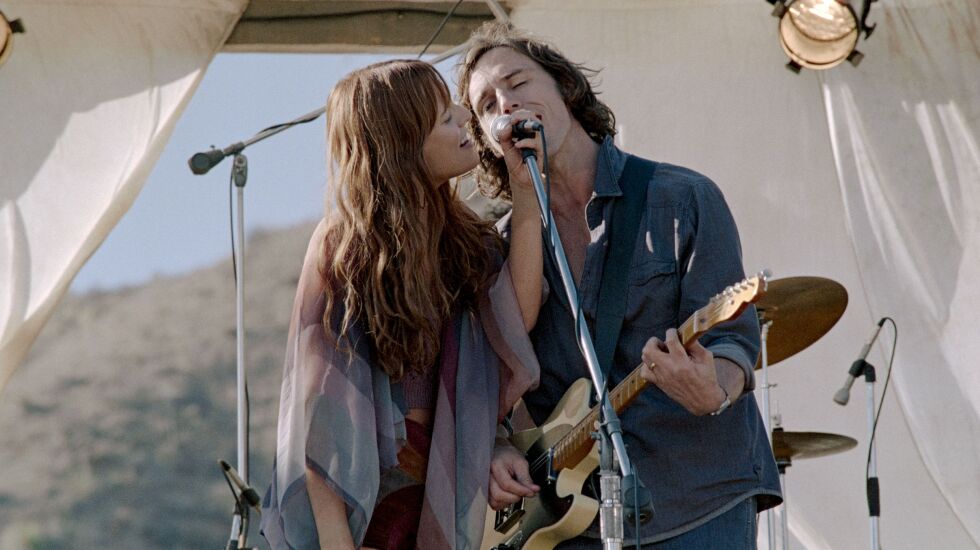
The 10-part Prime Video series “Daisy Jones & the Six” is bookended with concert footage of the titular band performing in front of a sold-out crowd at Soldier Field on October 4, 1977. We see saturated, grainy, period-piece clips of the members of the group greeting their worshipful fans, holding press conferences, grinding through recording sessions, partying hard, etc., as a title card tells us:
“They were one of the biggest bands in the world at the time, fresh off their award-winning, multi-platinum selling album ‘Aurora.’
“It would be their final performance.”
Sound vaguely familiar? Maybe your mom, or your older sister, was at that fateful show back in ’77? Or someone you know had that “Aurora” album on vinyl and played it until the grooves wore out? Daisy Jones & the Six, what was their big hit again?
For the record: Their biggest hit was arguably “Look at Us Now (Honeycomb),” but if you can’t quite place Daisy Jones & the Six, not to worry. They’re a fictional band, created by Taylor Jenkins Reid for her best-selling novel of the same name, and they’re getting the “Behind the Music” docudrama-style treatment in the ambitious, sprawling and addictively soapy limited series, which features star-power musical and acting work by Riley Keough (yes, Elvis’ granddaughter) and Sam Claflin as the leads, a deep roster of outstanding supporting performances, a number of catchy original tunes and consistently outstanding editing, cinematography and costumes.
Though clearly inspired by Fleetwood Mac, with Claflin in the Lindsey Buckingham “role” as the gifted and driven, guitar-playing Billy Dunne, and Keough as the gorgeous and entrancing but deeply troubled Daisy Jones, who swirls about the stage in bohemian fashions a la Stevie Nicks, the music of the Daisy Jones & the Six, and their meteoric rise and rapid decline, is also reminiscent of the fictional Stillwater from Cameron Crowe’s classic “Almost Famous.” With James Ponsoldt (“The Spectacular Now,” “The End of the Tour”) directing the first five episodes, esteemed music video director Nzhingha Stewart helming four and Will Graham handling the remaining one, “Daisy Jones & The Six” follows the ingenious format of the novel, which was presented as an oral history about a short-lived but seminal rock band.
In the series, the members of the long-disbanded group (along with a few other key players from the time) agree to individual interviews in 1997 — the first time in 20 years any of them have spoken out. Clips of these sessions are sprinkled in throughout the series, which otherwise follows a mostly straightforward timeline. We see how Keough’s Daisy grew up in a privileged but loveless home and struck out on her own at an early age, determined to have her voice heard. Meanwhile, Claflin’s Billy Dunne, his younger brother Graham (Will Harrison) and their friends Eddie Roundtree (Josh Whitehouse) and Warren Rojas (Sebastian Chacon) are making some noise in Pittsburgh as a local band — but as tour manager Rod Reyes (Timothy Olyphant) tells them, they’ll have to move to L.A. if they’re serious. With Billy’s photographer girlfriend Camila (Camila Morrone) joining them, the band hops into a beat-up van and heads West to pursue the great American Rock ’n’ Roll Dream.
The production design is spot-on as we feel immersed in the early 1970s music scene in L.A. (the New York Times reports “Daisy Jones & the Six” took over the Sunset Strip in Hollywood for a week of shooting). A number of integral figures are added to the mix, including Suki Waterhouse as the independent-minded British keyboard player Karen Sirko; Tom Wright as a legendary producer named Teddy Price, and Nabiyah Be as Simone Jackson, a disco icon and Daisy’s best friend. Real-world artists and songs are referenced throughout, as we hear everything from “Incense and Peppermints” by the Strawberry Alarm Clock to “Son of a Preacher Man” by Dusty Springfield to “I Feel the Earth Move” by Carole King. (Patti Smith Group’s “Dancing Barefoot” is heard over the opening credits sequence.)
Ah, but what about the original music of Daisy Jones & the Six? Blake Mills wrote and produced some two dozen original songs (some in collaboration with the likes of Phoebe Bridgers, Marcus Mumford, Jackson Browne and Chris Weisman), and a handful sound like bona fide tracks from the time. The series perfectly captures the sometimes tedious, often stressful, occasionally magical process of songwriting, recording and performing, with Keough and Claflin handling their own vocals in impressive fashion. (All of the cast members reportedly played their own instruments.)
Not that the only drama surrounding Daisy Jones & the Six involves differences over music. We’ve come to this point without revealing spoilers so you can experience each melodramatic and sometimes heart-wrenching twist fresh — though you’ll see some developments a mile down the road. Suffice to say there’s a love triangle, an affair or two, stints in rehab, concert performances that are sometimes legendary, sometimes horrific train wrecks, health setbacks, and much, much, more.
By the time we circle back to that final show (with Tad Gormley Stadium in New Orleans dressed up as Soldier Field), it’s a miracle the group has stayed together that long. Still, even with all the setbacks and betrayals and tragedies and heartbreak shadowing this band, the series is an exhilarating slice of fictional but authentic 1970s rock ’n’ roll. Long live Daisy Jones & the Six.







